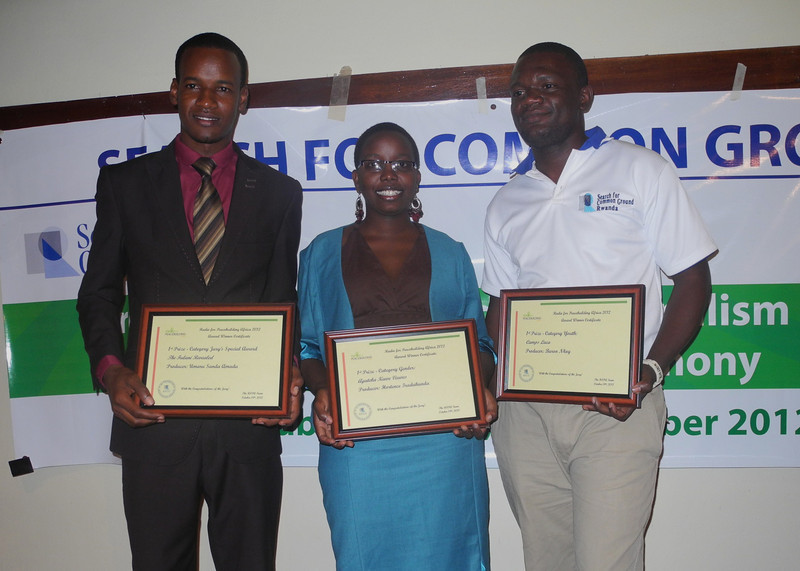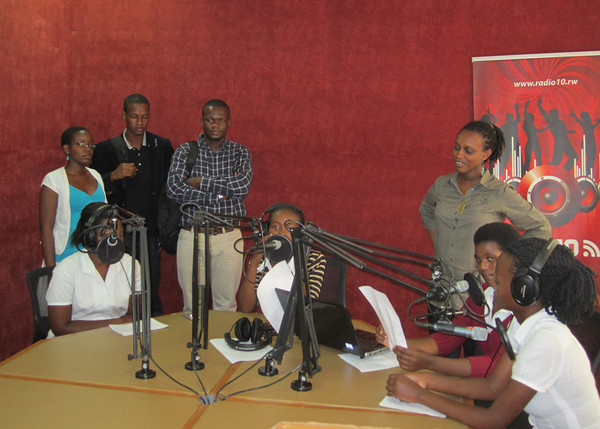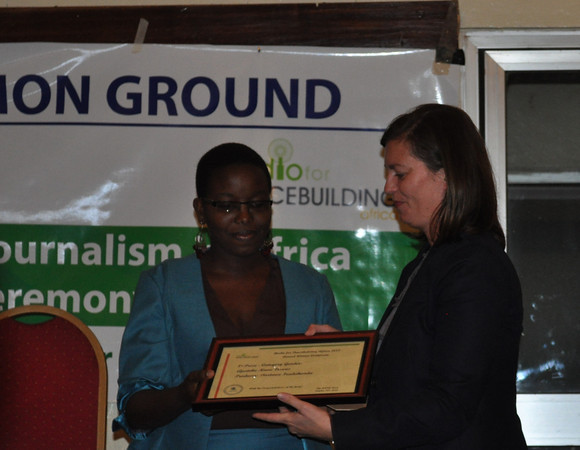2012 Radio for Peacebuilding Africa Awards - Official Results!
RFPA is pleased to announce the results of the 2012 RFPA Awards! RFPA received a diverse selection of programmes in the entries, including both fictional and non-fictional programmes; English, French, and local language broadcasts; and representation from countries across the continent.
The RFPA awards were presented on October 18th at a special ceremony in Kigali.

Narcisse Kalisa, SFCG Rwanda Program Director, welcomes attendees to the 2012 RFPA Awards
|
For this edition of the RFPA Awards, the three award categories were:
-
Youth
-
Gender
-
Jury’s Special Award
A prize was given to the top three entries for each category, recognising high quality radio programmes that contribute to peace in Africa. The jury members were media and peacebuilding experts from sub-Saharan Africa, as well as from Europe and the United States.
Visit the RFPA website audio section and listen to the best programmes submitted for this 2012 edition!

The awardees with their awards
|

Visting local radio stations while in Kigali for the awards ceremony
|
THE AWARDS GO TO:
YOUTH AWARD

Winner of the Youth Award, Baron Nkoy (left)
|
1st Prize: Luca (DRC, Producer: Baron Nkoy)
The winner of this category is a program of the show Bloc Notes broadcasted in the DRC. Camps Luca talks about a community of the same name in Kinshasa, the DRC, which suffers from water shortage. The program demonstrates the effect of this problem on youth, and interviews many schoolchildren about their experience with the lack of water and hygiene.
The jury thought that the programme was “very strong from the technical point of view and very clear in terms of the substance”, with a “variety of voices represented.” The topic is very relevant as access to water is a common problem in many rural communities in Africa.
2nd Prize: The Manenberg Crime (South Africa, Producer: Youth at the Druiweulei Community Center)
This innovative programme is produced by a group of youth who raises awareness about violence and bullying. It presents the impact of crimes on youth and how youth today need to find positive channels to transform their power.
The jury highlighted that “overall, the youth did a thorough job in showing that criminals arrested are usually between the ages of 13-35. They then examined the implication of these numbers.”
3rd Prize: Ndola Greendades Waste Disposal (Zambia, Producer: Ndola Greenades)
This programme brings awareness to the problem of waste and waste disposal. It encourages people to think about waste management and its importance for the community. The programme is about what youth can do for a more environment-friendly living. It is produced by youth, for youth.
The jury said that the programme used “creative ways to present the issues,” “energetic” and “engaging.” “They use a variety of techniques to make the programme convincing.”
GENDER AWARD

Winner of the Gender Awards, Hortence Iradukunda (left)
|
1st Prize: Agateka Kawe Veuves (Burundi, Producer: Hortence Iradukunda)
This programme addresses the issue of widows and how they are perceived by the family of the deceased. It explores crucial issues such as property rights, their role in the family and the stance Burundian law takes on widows and land ownership.
The jury was of the opinion that “the testimonies presented in the programme captured the attention of the listener.” “It included a variety of points of views and a lot of relevant information.”
2nd Prize: Egalite Hommes-Femmes (Togo, Producer: Foussein Saibou)
This programme was an episode from the weekly radio magazine “Parole à l’auditeur.” It explores the issue of gender empowerment and equality. It looks at women’s evolving role and how that is changing the man-woman dynamic. The programme presents an analysis by the journalist, but is also accompanied by a wide range of different perspectives of members of the audience.
“Egalité hommes-femmes” was praised by our jury for being “strong on listener participation” and “presenting diverse viewpoints.”
3rd Prize: Maggy: Une Maman Hors Pair (Rwanda, Producer: Jean-Marie Jabo)
This programme from Rwanda presents the Shalom House, a childcare center and orphanage that is a home for vulnerable and sick children. It paints an interesting portrait of its founder, Marguerite (Maggy) describing her motivation to establish the center. It also provides details on the purpose and function of the Shalom House.
The jury found the program to be “an interesting portrait and testimony of an inspiring woman” and a “strong and engaging radio emission.”
JURY'S SPECIAL AWARD

Winner of the Jury's Special Award, Umaru Sanda Amadu
|
1st Prize: The Fulani Revealed (Ghana, Producer: Umaru Sanda Amadu)
The winning programme combines reports about a Fulani tribe - who they are and how they are discriminated against. It presents the crimes they are accused of and the causes of this discrimination with testimonies of members and chiefs from different locations across Ghana. It includes interviews of non-Fulani people who describe preconceived prejudices against Fulani people.
The jury was impressed by the quality of the programme and praised it for its audience-friendly approach. It was complemented for having good sound effects and using of music as a technique to engage the listener.
2nd Prize: Prison Special (South Sudan, Producer: Chance Baniko)
This programme from South Sudan focuses on the theme of violence: domestic violence; abuse by police officers; and children’s imprisonment and their mistreatment in Juba prisons. By giving voice to the abused women and children, as well as the perspective of the authorities designated to deal with these crimes, the emission provides a balanced presentation of the issue of spousal violence and institutionalized abuse of these two vulnerable groups.
The jury agreed that this was an “interesting, informative and coherent programme” with “good testimonies” from the parties concerned.
3rd Prize: Réconciliation au Togo (Togo, Producer: Fousseni Saibou)
This programme is an episode of the weekly radio magazine “Parole á l’auditeur” in Togo, exploring the question of reconciliation and peace. It poses questions such as: Is peace a utopia or a real hope? How does the government’s strategy relate to the facts on the ground? The programme touches upon crucial questions relating to reconciliation which are relevant for many nations in African.
The jury said that “both the topic and the interviews are extremely relevant” with strong structure and important contributions from the audience.
All these programmes are now available on the RFPA website: www.radiopeaceafrica.org (for the programmes that are not in English, a translated script is available on request from RFPA).
Congratulations to all the winners and a big thank you to all the participants!
The RFPA Team
|







